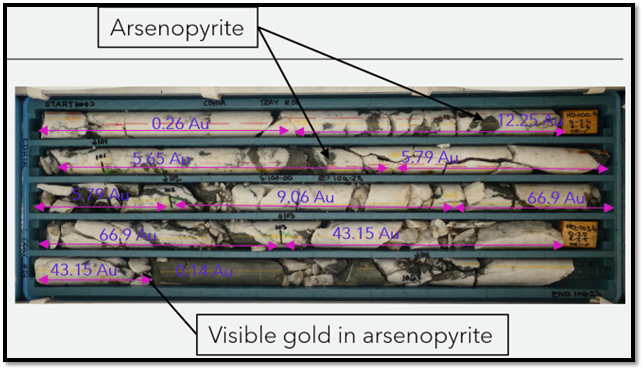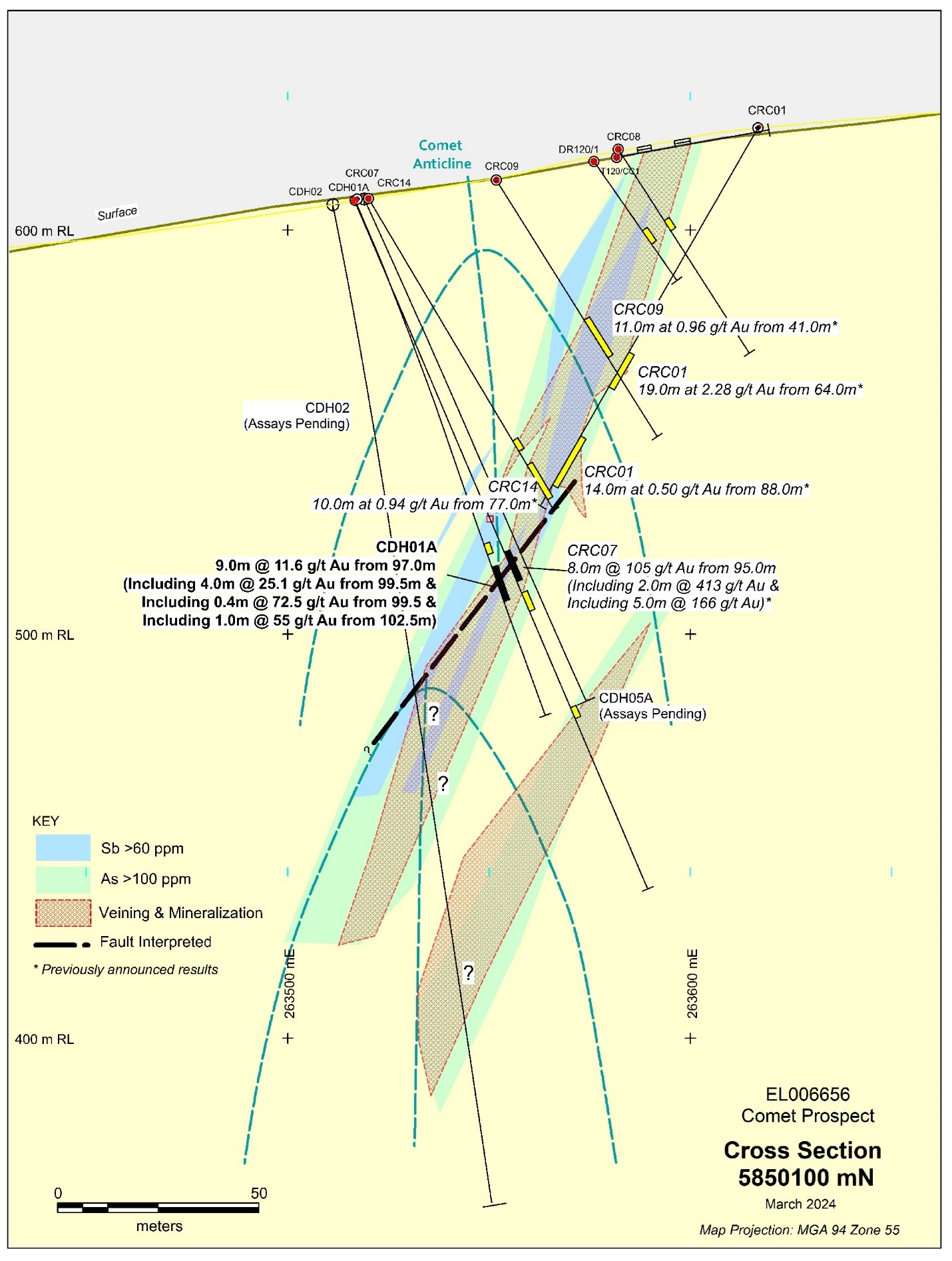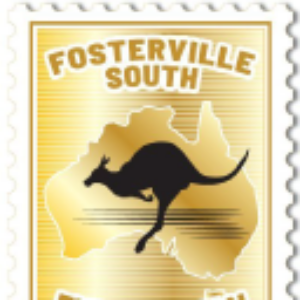REPEAT – Great Pacific Gold Announces High-Grade Assays on Follow Up at Comet Discovery
- Significant high-grade gold assays reported from the Comet gold discovery at the Lauriston Gold Project.
- Diamond drill hole CDH01A intersects 4m at 25.1 g/t Gold, including 0.4m at 72.5 g/t Gold.
- Visible gold present within arsenopyrite crystals in the high-grade intercept.
- Mineralization associated with strong quartz veining with large crystals of arsenopyrite and sulphidic stylolites.
- Company sets up drill hole CDH01A near previous high-grade discovery hole for mineralization extensions.
- None.
VANCOUVER, British Columbia, March 21, 2024 (GLOBE NEWSWIRE) -- Great Pacific Gold Corp. ("Great Pacific Gold,” “GPAC,” or the "Company") (TSXV: GPAC) (OTCQX: FSXLF) (Germany: 4TU) is pleased to announce high-grade gold assays from its initial follow up diamond drill hole of the Comet gold discovery at the Lauriston Gold Project in Victoria, Australia. Diamond drill hole CDH01A intersected 4m at 25.1 g/t Gold from 99.5m including 0.4m at 72.5 g/t Gold from 99.5m and 1m at 55 g/t Gold from 102.5m, within a broader interval assaying 9m at 11.6 g/t Au from 97m.
The high-grade intercept occurs within the core of the Comet Anticline at the fold axis, where the Comet Fault zone junctions with this fold. This high-grade gold mineralization is associated with strong quartz veining with large crystals of arsenopyrite and sulphidic stylolites within the quartz veins. Visible gold is occasionally present within the arsenopyrite crystals.
Figure 1 - Example of CDH01A drill core annotated with gold grades in g/t. Core tray is 100m to 104.23m

The Company set up diamond drill hole CDH01A in close proximity of the high-grade reverse circulation (RC) percussion discovery hole CRC07 (8m at 106 g/t Gold including 5m at 166 g/t Gold including 2m at 413 g/t Gold including 1m at 468 g/t Gold and 1m at 358 g/t Gold (from 95 metres) (see news release January 11, 2024)) as a conservative approach to determine extensions of mineralization. The hole CDH01A deviated once underway, steepening with depth and managed to drill about 8m down dip of the projected position of the CRC07 intercept.
Diamond drilling has confirmed the gold rich quartz veined fault zone is extending to depth and laterally with this CDH01A result, and the high-grade mineralization remains open in all directions.
Assays remain pending for two more diamond drill holes on the same section at Comet and will be reported once received. One of these diamond drill holes (CDH02) encountered multiple stacked zones of mineralization and due to this was extended by approximately 100m versus the originally planned target depth. CDH02 was drilled to 255.5m depth.
GPAC Chief Operating Officer and Director, Rex Motton, states, “The high-grade gold intercept in our first diamond drilling, post the reverse circulation discovery hole at Comet, is a great start to the program. In addition to the high-grade gold interval in the first diamond drill hole assaying 4 metres at 25.1 grams per tonne gold within a broader 9 meter mineralized zone, we also are very pleased with early information from the second hole. While no assays have been received for the second hole, it has already shown importance geologically as multiple zones of mineralization were encountered. The second hole, which was originally planned to a target depth of approximately 150 metres was continued until approximately 255 metres based on these stacked zones of mineralization encountered. We see this as early days for this extensive and highly prospective structure.”
The Comet prospect has epizonal characteristics of Au-As-Sb with geology similar to the Fosterville Mine gold deposit. The west dipping Comet fault zone is hosted by Ordovician slates and sandstones, which are folded in a series of north south striking concertina folds. This high-grade discovery is within the core of the Comet Anticline as determined by mapping and core orientation studies, which is a similar structural setting of the mineralization present at Fosterville.
Drill Results and Intercepts:
| HoleID | East | North | Azimuth (deg.) | Dip (deg.) | From (m) | To (m) | Downhole Interval (m) | Au g/t | ||||||||
| CDH01A | 263516.9 | 5850092.3 | 95.3 | -69.4 | 97.0 | 106.0 | 9.0 | 11.6 | ||||||||
| Includes | 99.5 | 103.5 | 4 | 25.1 | ||||||||||||
| includes | 99.5 | 99.9 | 0.4 | 72.5 | ||||||||||||
| includes | 102.5 | 103.5 | 1.0 | 55.0 |
The 9m intercept uses a 0.3 g/t Au cut-off grade and maximum 2m internal waste. The 4m intercept uses a 5.0 g/t Au cut-off grade and maximum 0.6m internal waste, while the higher-grade included intercepts use assays of greater than 40 g/t Au and no internal waste parameter. True widths are not known. Additional drilling is required to determine true widths. The assays are not capped.
Figure 2 – Updated Comet Cross Section 5850100mN

Quality Assurance / Quality Control
All assays were subject to quality control measures appropriate for percussion drilling with duplicates, blanks and commercially available standards with the expected results from the samples submitted. All assays were conducted by Onsite Laboratory Services Ltd (ISO: 9001), located in Bendigo, Victoria, using fire assay techniques with a 25g or 50g charge and ICP or AAS finish. The quality control results are consistent.
About GPAC
Great Pacific Gold has a portfolio of high-grade gold projects in Papua New Guinea (“PNG”) and Australia.
In PNG, Great Pacific Gold recently acquired a significant 2,166 sq. km mineral exploration land package in PNG. The land package comprises of exploration licenses (EL) and exploration license applications (ELA). It includes both early-stage and advanced-stage exploration targets with high-grade epithermal vein and porphyry-style mineralisation present.
The Arau Project consists of two exploration licenses, located in the Kainantu region, and includes the Mt. Victor Prospect, where previous drilling found a multiple phase intrusion complex hosting copper and gold mineralisation.
The Wild Dog Project consists of one granted exploration license, EL 2761, and one exploration license application, ELA 2516, located on the island of New Britain and about 50 km southwest of Rabaul and Kokopo, PNG.
The Kesar Creek Project consists of one exploration license, EL 2711, and is contiguous with the K92 Mining Inc. tenements.
In Australia, Great Pacific Gold began with two,
All GPAC’s properties in Australia are
Qualified Person
The technical content of this news release has been reviewed, verified and approved by Rex Motton, AusIMM (CP), COO of GPAC, a Qualified Person under the meaning of National Instrument 43-101 – Standards of Disclosure for Mineral Projects. Mr. Motton is responsible for the technical content of this news release.
On behalf of GPAC
Rex Motton
Chief Operating Officer and Director
Forward-Looking Statements
Information set forth in this news release contains forward-looking statements that are based on assumptions as of the date of this news release. These statements reflect management's current estimates, beliefs, intentions and expectations. They are not guarantees of future performance. Great Pacific Gold cautions that all forward looking statements are inherently uncertain and that actual performance may be affected by many material factors, many of which are beyond their respective control. Such factors include, among other things: risks and uncertainties relating to Great Pacific Gold's limited operating history, its exploration and development activities on its mineral properties and the need to comply with environmental and governmental regulations. Accordingly, actual and future events, conditions and results may differ materially from the estimates, beliefs, intentions and expectations expressed or implied in the forward looking information. Except as required under applicable securities legislation, Great Pacific Gold does not undertake to publicly update or revise forward-looking information.
Neither TSX Venture Exchange nor its Regulation Services Provider (as that term is defined in the policies of the TSX Venture Exchange) accepts responsibility for the adequacy or accuracy of this release.
For further information: Adam Ross, Investor Relations, Direct: (604) 229-9445, Toll Free: 1 (833) 923-3334, Email: info@greatpacificgoldcorp.com
Photos accompanying this announcement are available at
https://www.globenewswire.com/NewsRoom/AttachmentNg/0c344d80-9ba1-47bc-8a7a-93accba0919f
https://www.globenewswire.com/NewsRoom/AttachmentNg/db76c6d2-645b-4636-b533-b11d77450c17








